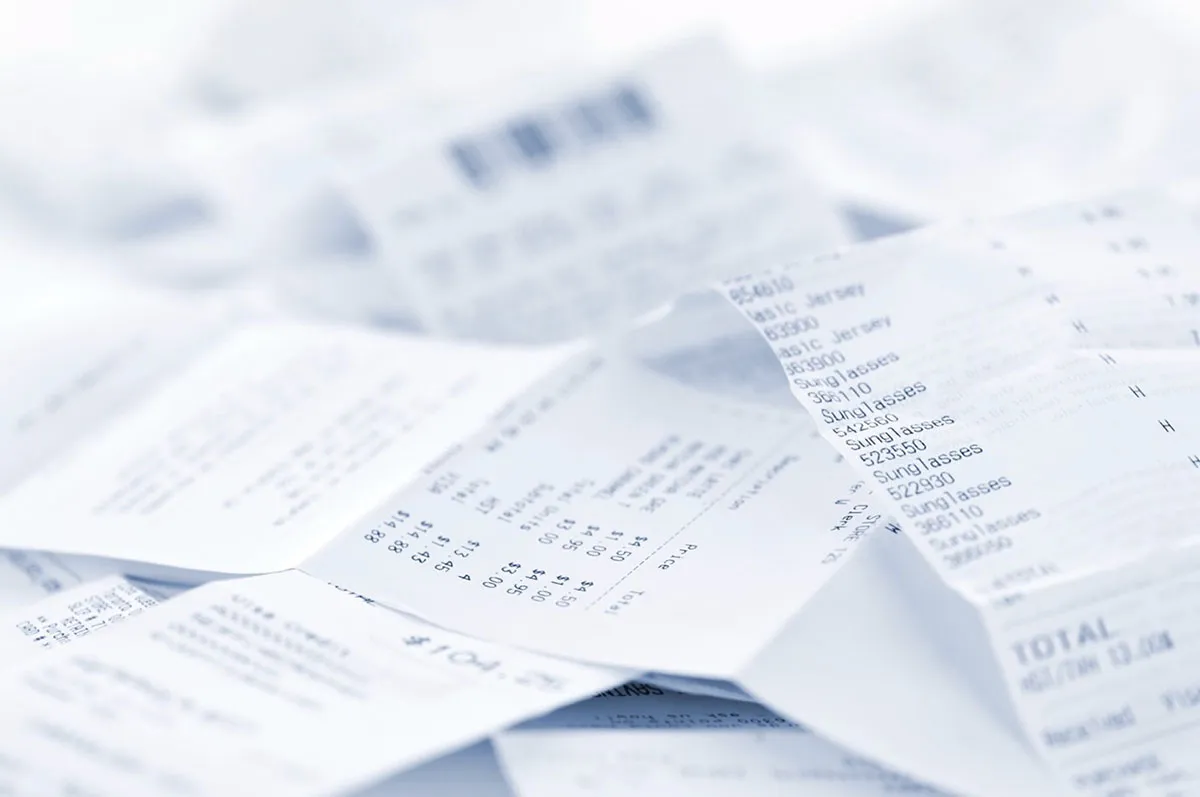
When a taxpayer is audited, the Internal Revenue Service (IRS) typically asks for documentation related to the tax returns in question. This documentation often includes receipts for business expenses, charity donations, and other types of deductions. Providing these receipts can sometimes be enough to resolve the dispute, but what happens if you get audited and don’t have receipts?
While the situation is not ideal, it’s not impossible. You may be able to use other items or financial records to substantiate your expenses, and an experienced tax attorney can help you determine how to best proceed. To get help now, contact us at Damien’s Law.
Key takeaways
- Burden of proof – If you are selected for an audit, you have the burden to back up the info on your return.
- Recordkeeping rules – By law, you’re supposed to keep tax records for three years.
- No receipts – If you don’t have receipts, you may be able to substitute other documents.
- Cohan rule – This rule allows busy business owners to claim some reasonable expenses without receipts.
- Audit representation – You don’t try to go through an audit without receipts alone. Contact an attorney for representation.
If you have recently been audited and have questions about receipts or another matter, you can learn more by contacting the team of experienced Mississippi tax attorneys at Damiens Law at (601) 476-1361.
Receipts and the IRS Burden of Proof
Taxpayers have a burden of proof for statements made on their tax returns. When you file your return, you don’t have to include backup documents to support your claims, but once you are selected for an audit, you must provide these documents.
In case you are audited, you should keep your records. The tax code requires you to keep tax records for three years in most cases and seven years in some situations.
You should have records for everything claimed on your return including income, deductions, business revenue, business expenses, mileage, etc.
Can business expenses be claimed without receipts?

A special provision called the Cohan Rule allows taxpayers to claim deductions for business expenses without receipts, as long as they provide accurate estimates of those expenses. This rule can be useful for some taxpayers who are audited without receipts, but its application is limited to taxpayers with certain circumstances.
The Cohan Rule is most commonly applied during audits, as there is no requirement to submit receipts with a tax return. But when an audit does happen, the taxpayer can rely on the Cohan Rule to substantiate estimates for allowable business deductions. The taxpayer must show that they incurred a valid business expense but cannot provide adequate documentation for the exact amount. If the taxpayer meets that requirement, they may claim a deduction for an amount deemed reasonable by the IRS or court.
In most applications of the Cohan Rule, the taxpayer will need to provide other records to prove the expense, such as books from their business. However, the Cohan Rule may be applied at the discretion of the IRS and there are scenarios in which it may be used based on reasonable assumptions to support the claimed expenses. There are even some situations in which the IRS may allow an unverified claim.
How Can You Substantiate Expenses Without Receipts?
If a business is being audited by the IRS and does not have receipts, there are other ways to provide documentation that meets the requirements of the Cohan Rule. While this process can be intensive and time-consuming, providing sufficient documentation can help resolve an audit and minimize penalties and interest. Some ways that business owners can document their expenses without audits include:
- Contact suppliers and service providers – These third parties may have invoices and receipts of their own, which they can provide to a business owner upon request.
- Review financial records – Bank account statements, credit card statements, and canceled checks all can provide a record of payment dates, amounts, and recipients.
- Review the business calendar – A business calendar may contain information related to business travel or meetings, along with a record of meetings with vendors and service providers.
- Look for email receipts – Search through emails for communications with other businesses, which may contain email copies of receipts.
Can You Make Up Receipts?
No, providing falsified documents to the IRS is considered to be tax fraud. You should not generate your own receipts.
What Kind of Business Records Can the IRS Request?
The IRS can request records related to anything noted on your tax return.
Recordkeeping is essential for business owners, and the specific types of records that should be kept vary depending on the type of business. But in general, businesses should have recordkeeping systems that encompass all of their business transactions, and they should also keep the documents that back up these records.
For example, say that you buy office supplies for your business. You will note the expense in your accounting records, but then, you should also save the receipt, whether it’s paper or digital.
However, what happens if you are selected for an audit and don’t have receipts? Here are a few of the types of documents you may be able to use for various types of business revenue and expenses:
Gross receipts/revenue
Gross receipts include all of the income that a business receives. Documents in this category include:
- Receipt books
- Invoices
- Deposit information (cash and credit sales)
- Cash register tapes
- 1099-MISC forms
Cost of goods sold
Cost of goods sold (COGs) includes inventory purchased to resell to customers and supplies purchased to make products to sell. For example, for manufacturers and producers, the cost of all raw materials and manufacturing parts are considered to be COGs.
If you don’t have receipts for these items, you may be able to rely on the following:
- Invoices
- Credit card statements
- Canceled checks or other documents that provide proof of payment
- Cash register tape receipts
If you don’t have receipts, the IRS may request a combination of supporting documents to prove all elements of a purchase. To give you an example, imagine that you have a payment noted on your bank statements. If the payment is to a company that exclusively sells products for resale, the IRS may accept this.
However, if the company also sells personal items to consumers, the IRS may want more details to ensure the purchase was business-related, such as a copy of the agreement you have with that supplier.
Expenses
Expenses include all costs (outside of COGs) that are necessary to the operations of the business. The IRS wants supporting documents for expenses to identify the payee, the payment amount, payment proof, payment date, and descriptions of each item to establish that they were used for business purposes.
The IRS may request the following documents for business expenses:
- Account statements
- Canceled checks or other documents that show proof of payment
- Cash register tape receipts
- Credit card statements
- Invoices
Travel, transportation, entertainment, and gift expenses
Businesses that deduct expenses for travel, entertainment, gifts, or transportation must substantiate specific elements of these expenses. In the absence of receipts, notes about how the transaction was business-related may be accepted.
Also, note that certain expenses do not require receipts. For example, the IRS allows a certain meal allowance when you’re traveling for business. You can claim that daily amount with the receipts to back it up.
Capital assets
Assets include all property that the business owns and uses in the course of business operations, such as office furniture or machinery. The IRS wants business owners to keep records that verify specific information related to business assets. These records are also used to calculate the property’s annual depreciation, along with the losses or gains when these assets are sold.
The IRS may request documents like invoices for sales and purchases, real estate closing statements, and canceled checks to verify the assets of a business.
Documents that are used for assets should include the following information:
- When and how the assets were acquired
- Purchase prices
- Costs for any improvements
- Whether a Section 179 deduction was taken
- Depreciation deductions
- Casualty loss deductions (such as losses caused by natural disasters)
- How the asset was used in business
- When and how the asset was disposed of
- Selling prices
- Expenses of sale
Often, when you’re dealing with big assets, it’s easier than not having a receipt for a small expense. The seller is much more likely to have a record of the transaction that they can share with you for a big purchase than for a small purchase.
Employment tax records
The IRS asks business owners to keep all payroll tax records for at least four years after filing the 4th quarter of the year and may request these records for review as well.
Luckily, you don’t need receipts here. Instead, employment tax records may include:
- Dates and amounts for all wage, pension, and annuity payments
- Tips employees have reported to the business
- Records of allocated tips
- Names, occupations, social security numbers, and addresses of all employees and recipients
- Employment dates for all employees
- Records for times when employees and recipients were paid while not working (such as sick days or time off due to injuries) and the amount of these payments
- Copies of income tax withholding certificates for employees and recipients
- Tax deposit records, including amounts and dates – this should be available electronically through the IRS and/or your state’s website.
- Records for employee reimbursements for fringe benefits and expenses
- Documentation for all credits claimed
What to Expect If You Don’t Have Receipts for an Individual Audit
You may need receipts during an audit of your individual income tax return if any of the following apply:
- You itemized deductions.
- You claimed deductions for charitable contributions.
- You are self-employed and filed a Schedule C.
In all of these scenarios, you will need to get creative. Start by contacting the entity on the other side of the transaction. For example, if you claimed a deduction for medical bills, contact your clinic or hospital for a copy of the bills you paid.
Can You Go to Jail for Not Having Receipts?
Not having receipts is not a crime. However, if the IRS believes that you are not supplying receipts in an attempt to evade taxes, they may recommend criminal or civil tax fraud charges against you.
What If I Fail an Audit Due to Not Having Receipts?
If you fail an audit, you may incur penalties and face a tax liability. However, you also have the right to appeal. If you handled the audit on your own, contact an attorney to help you with the appeal.
Contact our Mississippi tax attorneys to learn more
If you are wondering what happens if you get audited and don’t have receipts, Damiens Law is here to help. We can evaluate your unique tax situation and formulate a strategy for resolving the audit. Contact Damiens Law today at (601) 476-1361 to learn more about your legal options after being audited by the IRS, or schedule a call here.



